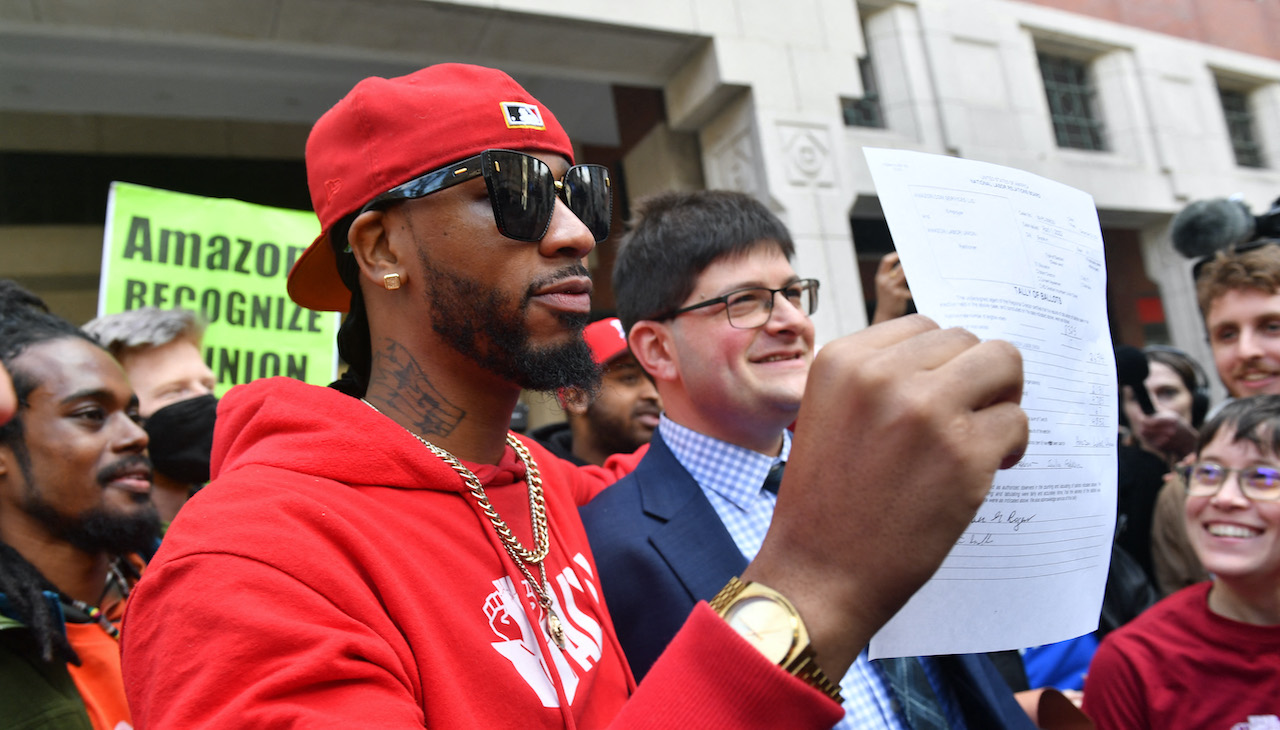
How a New York Amazon warehouse became the first to ever unionize
Led by former worker Christian Smalls, the union is the first victory for Amazon workers against their employer.
On Friday, April 1, the Amazon Labor Union (ALU) scored a historic victory when it became the first-ever union to successfully organize Amazon employees.
Christian Smalls, the president of ALU, began speaking out against poor treatment in March 2020, and he organized a walkout over safety conditions for his co-workers at the start of the ongoing COVID-19 pandemic.
Smalls, who was fired the same day he led the walkout, continued to rally his former colleagues and in January 2022, he amassed just enough votes to qualify for a formal union election.
Amazon fired Smalls for violating quarantine and safety measures, but Smalls knew it was a retaliation for his activism. The New York Attorney General followed with an investigation, sued Amazon and even sought to get Smalls his job back. But he had bigger plans.
Staten Island Amazon workers formed the company's first U.S. labor union on Friday.
— Democracy Now! (@democracynow) April 4, 2022
Christian Smalls (@Shut_downAmazon) tells the story of how @AmazonLabor overcame the union-busting campaign waged by the multibillion-dollar company. pic.twitter.com/KykmhU76NW
On Friday, the workers of Amazon’s JFK8 warehouse in Staten Island, New York, voted to unionize with a vote of 2,654 to 2,131.
In a press release, the union said it was fighting for "higher wages, job security, safer working conditions, more paid time off, better medical leave options and longer breaks."
It was a hard-won victory which came after years of work, and labor advocates are already hoping to apply the same tactics to the hundreds of thousands of other Amazon warehouses across the country.
After the RWDSU’s failure to unionize the warehouse workers in Bessemer, Alabama, the newly established ALU is charting a brand new path, and forcing the retail giant to reevaluate its working conditions in many of its centers.
From the beginning, ALU developed its own way of doing things. Rather than knocking on doors, the organizers camped out near the warehouse, handing out literature, answering questions and sharing stories about how much Amazon was spending on things like corporate salaries and labor consultants.
When they needed to, they shifted focus just on two NYC warehouses, JFK8 and LDJ5, and posted videos to social media to get the word out. They also hosted phone banks, where they called every single worker eligible to vote in the election.
BREAKING: AMAZON LABOR UNION WINS HISTORIC FIGHT FOR THE FIRST AMAZON UNION IN THE ENTIRE US‼️ pic.twitter.com/GvUDLiw0Yu
— Amazon Labor Union (@amazonlabor) April 1, 2022
Most importantly, organizers said Amazon severely underestimated their determination.
Gerald Bryston, ALU’s sergeant-at-arms, told The Verge that the company routinely dismissed him and his fellow organizers. Bryston said that Amazon representatives would call them inarticulate “thugs,” and this behavior was cited in a lawsuit from the National Labor Relations Board (NLRB.)
Another critical difference between the successful Staten Island movement and the unsuccessful union drive in Bessemer, Alabama is that ALU was independent.
RELATED CONTENT
Bessemer’s efforts were mainly coordinated by the Retail, Wholesale and Department Store Union (RWDSU), an 85-year-old labor union that already represents thousands of workers.
Bryson wholeheartedly believes that the ALU will be able to keep making progress and part of his confidence stems from the faith and trust he puts in Smalls.
“For everything that they say about Chris, he’s got a heart of gold. We all sit down, and we listen to each other — no decision that you hear coming out of his mouth is just Chris,” Bryson said.
The moment Amazon workers at the JFK8 warehouse declared victory in their vote to form the first Amazon union in the United States pic.twitter.com/Fr92Wz1LIN
— Kei Pritsker (@KeiPritsker) April 1, 2022
In a Twitter post, Smalls said that since the vote to unionize, workers in more than 50 Amazon warehouses nationwide have contacted the union.
According to Amazon’s website, the company’s warehouses can employ more than 1,500 full-time employees, so if all 50 warehouses were to unionize, it would impact about 75,000 workers.
Amazon spent millions of dollars on labor consultants in efforts to demolish the union campaigns. It even had Smalls and other organizers arrested for trespassing while they were delivering food and union materials to the warehouse parking lot earlier in the year.
Amazon spent $4,200,000 to block this union. Four million two hundred thousand dollars.
— Beloved, breathe. (@aisha1908) April 1, 2022
Amazon had attempted to belittle the union drive back in 2020, when as part of its Public Relations strategy, the company said it would make Smalls “the face of the entire union/organizing movement."
That did happen, but Smalls became the face of one of the most successful union drives in recent history.
"Amazon doesn't become Amazon without the people. And we make Amazon what it is,” Smalls said.











LEAVE A COMMENT: